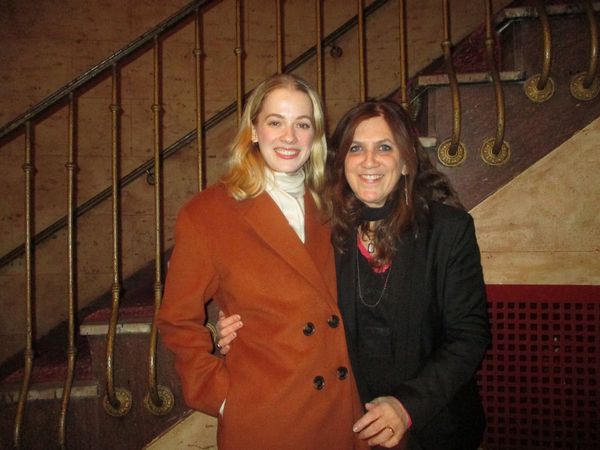 |
| Tess Frazer joined Stacy Cochran for the opening night Write When You Get Work Q&A, moderated by Anne-Katrin Titze at Village East Cinema Photo: Anne-Katrin Titze |
In the final instalment of my conversation with Write When You Get Work director/screenwriter Stacy Cochran, we go into the nature of the characters, played by Finn Wittrock, Rachel Keller, and Emily Mortimer, and touch on Alfred Hitchcock's Rear Window, Michael Powell's Peeping Tom, Ernst Lubitsch's Trouble In Paradise, and Hirokazu Kore-eda's Shoplifters.
Jonny (Wittrock) and Ruth (Keller), the couple at the heart of Write When You Get Work, struggle on their own until the death of an important person for both of them encourages Jonny to take audacious steps to enter back into her life. Ruth has moved on to a position at a private girls school on Manhattan's Upper East Side, run by an over-confident Guy Brinckerhoff (Scott Cohen).
 |
| Finn Wittrock as Jonny has a David Lynch eeriness element in his performance. |
When Jonny finds out, he invades her space and sees an opportunity to move forward, after encountering a distraught Nan Noble (Mortimer) who has a child enrolled where Ruth is now interim head of admissions.
Anne-Katrin Titze: The moment when we first see Ruth [Rachel Keller] in her apartment, that's your take on Rear Window and Peeping Tom?
Stacy Cochran: We did mention Rear Window and Peeping Tom. But not like, let's make it look like this.
AKT: No, it's nice, not pretentious at all. It has lightness. But what comes as a surprise is when she [Ruth] finds someone, Jonny [Finn Wittrock], in her apartment that was locked. She doesn't seem to be all too surprised by it. It startled me.
SC: I hope so. I mean I would want it to startle you more than it startles her. I'm stumbling, because I want to say one more thing about the Rear Window thing.
AKT: Go, go!
SC: In the script it's written like "If you were to be standing across the street, here's what you would see in her window." It was also a real time saver, writing it that way, because, once we were there, we didn't say, okay, she's getting dressed for work, what should we do?
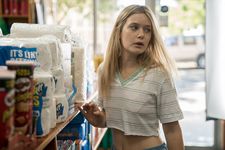 |
| Stacy Cochran on Rachel Keller as Ruth when Jonny appears: "She kind of has a little moment but she keeps going. You know, it's really private, her startle." |
Should we go inside or outside? No, the script says, you're across the street. You are you, whoever the audience is. That was part of why we were able to do it so quickly, I think.
AKT: What about the break-in?
SC: I was really stubborn about not shooting too many options. So as not to be confusing with too many options. I really didn't want one where she jumped out of her skin because someone was standing behind her.
I just love the idea on one level, if it's his voice, it transcends the fact that she hasn't heard his voice in eight or nine years. I thought more important than the startle was the idea that this is very familiar to her. And even though he's never exactly done this ...
AKT: … this is what he does?
SC: This is what he does. That was really something that was important to convey - more than the jump. She kind of has a little moment but she keeps going. You know, it's really private, her startle.
AKT: The eeriness has a David Lynch "I'm here right now" element to it.
SC (laughing happily): That's a compliment!
 |
| Emily Mortimer as Nan Noble with her husband Steven (James Ransone): "'I have people but I'm alone'." |
AKT: There is a slight sense of horror in there, isn't there? That's the uncanny. No horror without it being in the home.
SC: That's funny, maybe that's true. I'm not an expert on horror and how it's built but there's the other side. I felt that from the first frame they're in love; they're in love at the beginning and the end and they're in love in the middle. It's just if they're willing to acknowledge that and they can get all the other noise out of the way.
I didn't want you to know if they loved each other or hated each other and that was the fun of it. But to me, privately, as the person who is making the movie, they are always in love. Especially when they hate each other. On some molecular level she loves him.
AKT: What he does to her door! And he gets away with it!
SC: That was probably the toughest thing to pull off.
AKT: Did you ever see somebody do this?
SC: No, but in the very first apartment I lived in in New York - and I married my college boyfriend, so we were together from the minute we got here. So that was the kind of lock. It's called a police lock. I had lived with one like that and he [Jonny] just used a broomstick version [in Write When You Get Work].
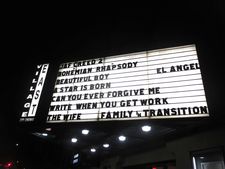 |
| Write When You Get Work on the Village East Cinema marquee in New York Photo: Anne-Katrin Titze |
AKT: It's fascinating and something I have never seen. It looks so violent.
SC: Oh, that makes me so happy. It was meant to be as violent as possible. And it's also an attempt to protect her.
AKT: Emily Mortimer is great in your film [as Nan Noble]. She has some of the most fantastic lines. My favourite is: "When the tide goes out, you don't leave your best fish to die on the shore." Wow, that is such a ridiculous sentence!
SC: Oh, my gosh, that's the nicest thing you could have said. I did hear someone say that, about 15 years ago, I think. And I thought I will never forget that and some day I will do something about the class of people who feel that they're entitled to the world, and I'm not going to ever forget that line.
AKT: It's absurd and crazy and she is in her tennis gear when she says it and Emily is perfect in her delivery.
SC: Oh my god, I just love her.
AKT: At Eye For Film we have the Nivola Files - I did a lot of features with her husband Alessandro.
SC: Oh, how nice! They are both just wonderful.
AKT: Yes, they are. Another line Emily says in your film that says a lot about friendship is "I have people but I'm alone."
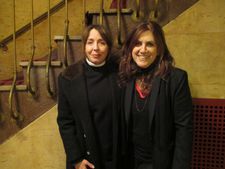 |
| Anne-Katrin Titze with Write When You Get Work director Stacy Cochran at the theatrical première Q&A Photo: Tess Frazer |
SC: Gosh, I'm so thrilled that you even noticed that, much less say it back to me. I mean, there was a challenge in the story to make something, I guess, believable between Jonny and Nan. It was tricky, I didn't want you to say, why in the world would she ever trust him with anything, let alone all of her belongings.
That line was crucial that she not only genuinely shared things that are hard for her with Jonny, but to convey how badly she needed to convey that to someone. And I feel despite what he is doing at her, he really hears her.
AKT: The idea of stealing things, taking things - did you see Shoplifters? The Kore-eda film that won the Palme d'Or at Cannes this year?
SC: As a matter of fact, I didn't. I'd like to.
AKT: I was at the press screening recently. It is a very interesting take on makeshift families and stealing. There are some parallels.
SC: I've heard really good things about it. I have seen Trouble In Paradise, though, which is about crooks.
AKT: So, is it important that they are crooks?
SC: I think so. Crooks and frauds. Everyone is. Even Guy Brinckerhoff [Scott Cohen] who is the Chairman of the Board of the school, he actually launders money in order to make what he wants to work work.
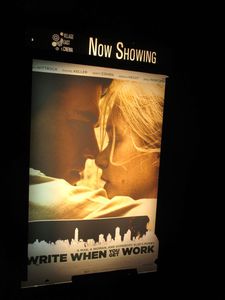 |
| Write When You Get Work poster at Village East Cinema Photo: Anne-Katrin Titze |
AKT: Any new projects coming up?
SC: There's a few. One where the script is pretty much ready. It's about hockey.
AKT: Hockey?
SC: Shall I tell you about it?
AKT: Yes.
SC: It's set in 1969. There's a book by Jerry Eskenazi, called A Year On Ice. He wrote it in real time. As the season was going, he was writing the book, as he was assigned to do by the publisher. And so it's completely fictionalised. It follows the season authentically, but they're not called the [New York] Rangers because there's a kind of Hitchcock story on top of it.
AKT: It's not '69 but 1968, but I just did an introduction at the Goethe-Institut of Margarethe von Trotta's series Anniversaries, based on the novel by Uwe Johnson. Each chapter is a day from August '67 to August '68.
A mother is telling her daughter about her past. There are three levels - one of them is the daily headlines of The New York Times. It is one of the great New York novels.
SC: I don't know it at all! Wow.
AKT: The full translation was just published. You should take a look.
SC: I definitely will. It sounds great.
Read what Stacy Cochran had to say on cinematographer Robert Elswit, costume designer Samantha Hawkins, camouflage, and the visual storytelling in Write When You Get Work.
Rachel Keller and Finn Wittrock will join Stacy Cochran for a post-screening Q&A in Los Angeles on December 7.
Write When You Get Work is in cinemas in the US.





















